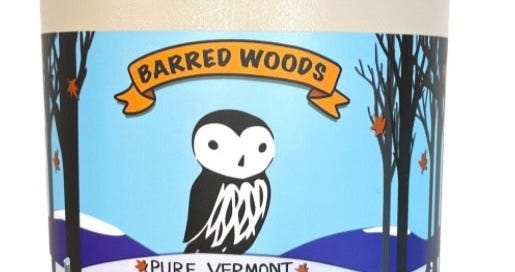Every Monday, I bring paid subscribers a special feature called Red Beans & Advice. It includes my tips and observations about various aspects of the food world. Since there are so many new readers, I’m sharing Red Beans this week with all of you. It includes a special offer that helps a small company.
For the past few years, I’ve been a customer of Barred Woods Maple on Etsy. I was searching for granulated maple sugar, and their shop in Essex Junction, Vermont, came up. Since my initial order, I’ve purchased maple syrup and maple candy from them, too. The quality is high and I’ve enjoyed learning about different grades and varieties of maple products.
I recently emailed with Dawn Hall, the co-owner of Barred Woods, which is a certified organic farm. She had many years of semiconductor industry experience before she became a maple entrepreneur.
A short season in the Great Lakes, not so in Vermont
I was interested to hear how Barred Woods’ season went. Here in Michigan and Southwestern Ontario, the sap ran very early. There was maple syrup for sale in February, which is several weeks before it usually comes in, causing some people to race to get their annual supply.
Things were a little different in Vermont, Dawn told me. “We currently have a large supply of maple syrup since the season just ended, and it was very productive,” she said. “The warm weather you had this past winter in north-central US cooled off enough by the time it reached the mountains of northern Vermont.”
That led to “ideal sugaring weather - cool nights and warm days. Our syrup also had excellent flavor this year, very buttery and rich.”
As you’ll see on its website, Barred Woods sells a variety of types of maple syrup, in different sizes, from little gift bottles to bulk quantities as big as 55 gallon barrels. (Most businesses buy the 2.5 gallon container,)
Dawn says there’s an important story around the sustainability of maple syrup and maple sugar, versus other sweeteners such as cane sugar or corn syrup.
“We produce our syrup on 1,300 acres of natural forest. The trees are not planted, fertilized, irrigated, or sprayed with insecticides, they are naturally there. Our forest is home to wildlife like bears, moose and fisher, and we manage it to optimize carbon sequestration to help counter the global threat of CO2 emissions.”
By contrast, many commercial sugar cane plantations or corn fields require extensive annual resources to grow a crop, she says. “So whether you buy from us or another maple producer, maple syrup and maple sugar are a good environmentally friendly choice.”
Maple syrup is also vegan, as I learned when I took a maple syrup cooking class in Massachusetts. That contrasts with honey, which vegans avoid because it is produced by living creatures, i.e. bees.
Many uses for maple syrup
I recently placed my order for my 2024 supply of maple syrup. I find that the darker varieties provide the most flavor in cooking, while the light variety is best for pancakes, waffles and to use as a topping. Try light maple syrup on chocolate ice cream sometime for a multi-textured treat.
Along with conventional maple syrup, maple sugar and maple candies, Barred Woods website also includes some interesting specialty maple products, such as bourbon barrel aged maple syrup, maple cider syrup, and a special reserve organic syrup.
If you’re planning a wedding, a party or a company event anytime soon, you can order half pint jugs of maple syrup to give as favors. I’ve gifted people with these and the syrup simply disappears.
Barred Woods has a special offer for CulinaryWoman readers. Use the code CULINARY15 for 15 percent off any two products. There is free shipping on orders over $49, and $6 otherwise. Visit their shop here.
Please let me know if you order some, and what you think. Maple sugar has a permanent spot on my breakfast table — in fact, I had some for breakfast on yogurt and strawberries. Thanks, Dawn, for sharing this offer with CulinaryWoman readers.





